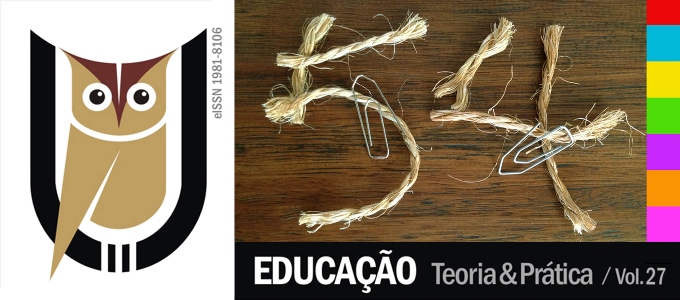EL TEXTO LITERARIO EN EL AULA Y EL DESARROLLO DE FUNCIONES PSÍQUICAS SUPERIORES: REFLEXIONES NECESARIAS
DOI:
https://doi.org/10.18675/1981-8106.vol27.n54.p23-39Palabras clave:
Texto literario. Funciones psíquicas. Teoría histórico cultural. SemióticaResumen
Este trabajo tiene como objetivo analizar el desarrollo de funciones psíquicas superiores a partir del texto literario trabajado en el aula. El análisis se hace a la luz de los fundamentos de la Teoría Histórico-Cultural en Vygotsky y de la Semiótica francesa. Buscamos reflexionar sobre cómo se trabajan los textos literarios en la educación escolar y si existen posibilidades para la construcción del pensamiento elaborado y crítico. La metodología consiste en un estudio teórico de autores como Vygotsky (1989, 2001, 2008); Luria (1990); Leontyev (1969); y Fiorin (2000, 2005), entre otros. Por el análisis interpretativo del texto es posible la construcción subjetiva de la relación entre el autor y el lector (estudiante, profesor), entre el narrador y el narratario, y entre los personajes del cuento, además de la reconstrucción del contexto literario en el que se inserta el trabajo. A partir de este ejercicio crítico, podemos pensar en nuevas alternativas para trabajar con el texto literario en los espacios de formación escolar. Palabras clave: Texto literario. Funciones psíquicas. Teoría histórico cultural. SemióticaPublicado
Cómo citar
Número
Sección
Licencia
Os Autores que publicam nessa revista concordam com os seguintes termos:
a) Os autores cedem os direitos autorais à revista, com o trabalho simultaneamente licenciado sob a Creative Commons Attribution License que permite o compartilhamento do trabalho com reconhecimento da sua autoria e publicação nesta revista.
b) A política adotada pela Comissão Editorial é a de ceder os direitos autorais somente após um período de 30 meses da data de publicação do artigo. Transcorrido esse tempo, os autores interessados em publicar o mesmo texto em outra obra devem encaminhar uma carta à Comissão Editorial solicitando a liberação de cessão dos direitos autorais e aguardar resposta.
c) Esta revista proporciona acesso público a todo o seu conteúdo, uma vez que isso permite uma maior visibilidade e alcance dos artigos e resenhas publicados. Para maiores informações sobre esta abordagem, visite Public Knowledge Project, projeto que desenvolveu este sistema para melhorar a qualidade acadêmica e pública da pesquisa, distribuindo o OJS assim como outros softwares de apoio ao sistema de publicação de acesso público a fontes acadêmicas. Os nomes e endereços de e-mail neste site serão usados exclusivamente para os propósitos da revista, não estando disponíveis para outros fins. This journal provides open any other party  Esta obra está licenciada sob uma Licença Creative Commons
Esta obra está licenciada sob uma Licença Creative Commons











